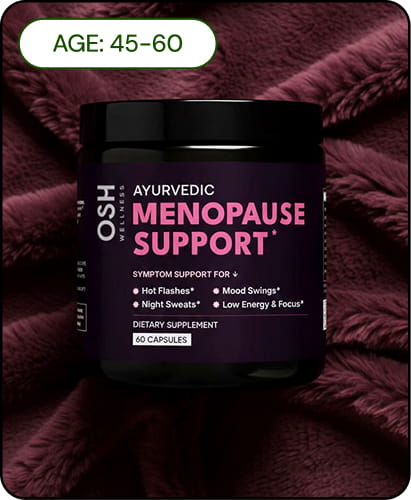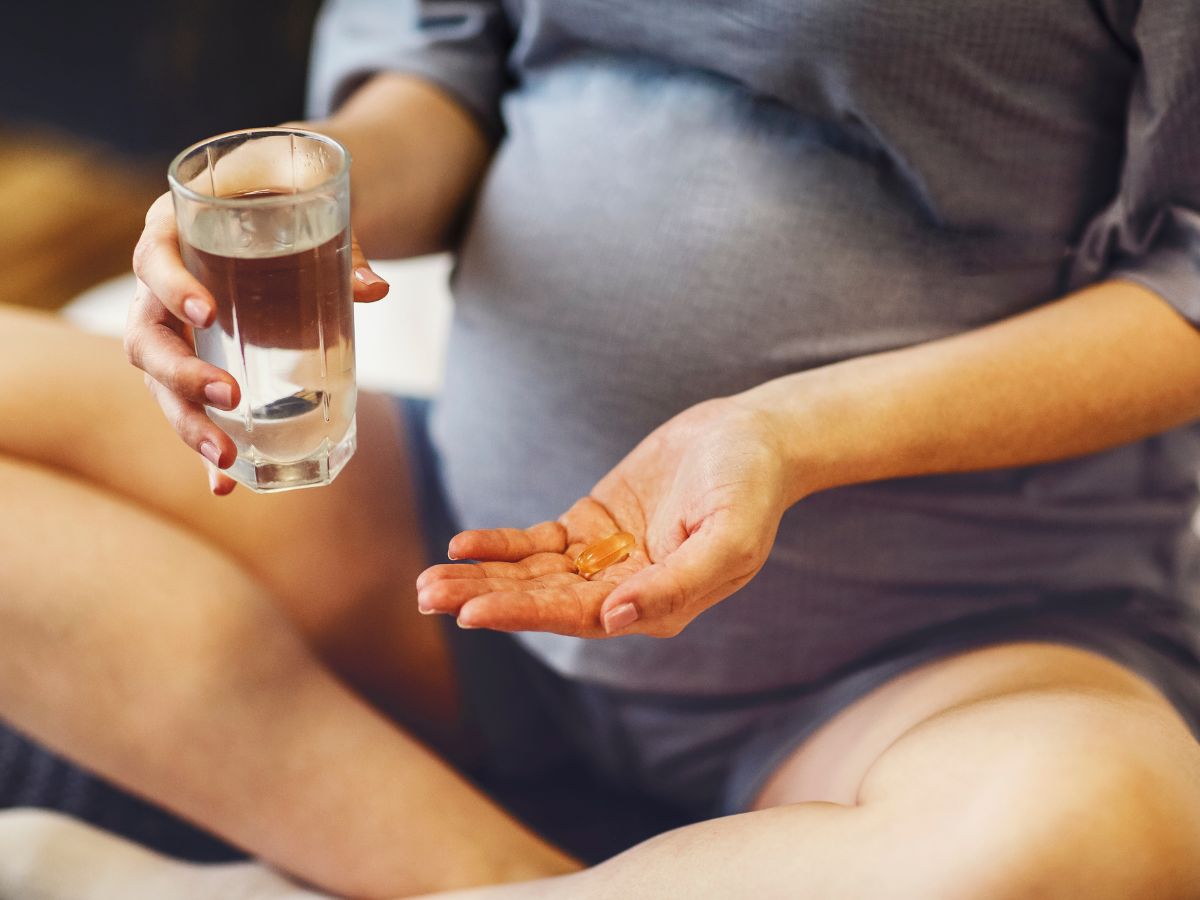Contents
Introduction
Polycystic ovary syndrome (PCOS) is a common medical condition that affects hormone levels in females. It is characterized by irregular menstrual periods, unwanted hair growth, mood swings, and acne. PCOS doesn’t only negatively impact fertility but also increases the risk of other health issues such as diabetes and high blood pressure. Fortunately, there are several treatment options that can help alleviate the symptoms of PCOS.
Let’s learn more about PCOS, its causes, symptoms, and treatment.
What is PCOS?
Polycystic ovary syndrome (PCOS) is a hormonal condition that affects ovaries, the female reproductive organs that make eggs. It affects about 1 in every 10 women who are of childbearing age [1]. It's one of the most common causes of difficulty in conceiving. PCOS can cause irregular periods, acne, and unwanted body and facial hair.
PCOS generally starts after puberty, but may not be diagnosed until you’re trying to get pregnant. It never goes away completely, but symptoms usually get better after menopause. In the meantime, several treatments and remedies can relieve the symptoms or help you get pregnant.
What are the Causes of PCOS?

PCOS is a complex hormonal condition with multiple factors contributing to its development. While the exact cause is unknown, several factors are thought to be involved:
Weight: Weight gain is known to play a role in the development of PCOS. Ironically, PCOS can also contribute to weight gain, creating a difficult cycle.
High levels of androgens: Hyperandrogenism, characterized by excessive male hormones, is a common feature of PCOS.
Insulin resistance: Insulin resistance, where the body blocks glucose from entering cells, can affect ovulation and contribute to weight gain.
Long-term, low-grade inflammation: Chronic inflammation can lead to the overproduction of androgens, exacerbating the PCOS symptoms.
The genetic link to PCOS is not fully understood, but having a family history of PCOS increases the risk. Up to 20-40% of women with PCOS have a close relative with the condition, suggesting a possible genetic component [2].
What are the Symptoms of PCOS?

PCOS is characterized by a set of symptoms that can vary from person to person. The most common signs include irregular, infrequent, or prolonged periods . Other symptoms include:
Hair loss: Thinning hair, especially in middle-aged or older women
Excess face and body hair (hirsutism): Hair growth in unwanted areas, such as the face, chest, belly, arms, fingers, and toes
Oily skin: Skin that is excessively oily due to high androgen levels
Acne: Breakouts on the face, chest, and/or back
Darkened skin: Patches of skin that appear darker than the surrounding area
Skin tags: Small flaps of excess skin, often on the neck or armpits
PCOS pain: Pain in the lower-belly (pelvic) area during periods and occasionally at other times
Weight gain: About 50% of those with PCOS experience weight gain, especially in the abdominal area
Ovarian cysts: Large or cystic ovaries visible on ultrasound
Mood changes: Increased risk of mood swings, depression, and anxiety due to hormonal changes and symptom management.
High levels of male hormones: Extra male hormones disrupt the menstrual cycle, so women with PCOS get fewer periods than usual.
Irregular or skipped periods: The lack of ovulation alters levels of estrogen, progesterone, FSH, and LH. Progesterone levels are lower than usual, while androgen levels are higher than usual.
These symptoms can be mild or severe and may not always be present.
Types of PCOS

Let us explore the 4 main types of PCOS. These are namely:
Type A PCOS: This is considered the most severe and typical presentation of PCOS. High androgen levels, irregular or absent periods, and polycystic ovaries characterize it. Women with Type A PCOS often struggle with symptoms like acne, excess hair growth, and difficulty losing weight.
Type B PCOS: This type of PCOS is also characterized by high androgen levels and irregular or absent periods but with the absence of polycystic ovaries. The symptoms are similar to Type A but may be slightly less severe.
Type C PCOS: This type is defined by high androgen levels and the presence of polycystic ovaries but with regular menstrual cycles of less than 35 days. Symptoms like acne and excess hair growth may be present, but ovulation is not necessarily disrupted.
Type D PCOS: Type D PCOS is considered the mildest form of the condition. It is characterized by irregular or absent menstrual cycles but with the presence of polycystic ovaries. Unlike other types of PCOS, women with Type D PCOS typically have normal androgen levels. As a result, symptoms such as acne and excess hair growth are less pronounced than the other types.
How does PCOS Affect Your Body?
PCOS is a hormonal disorder that can impact various aspects of a woman's health, including fertility, metabolic health, and overall well-being.
Fertility and Conception

- Irregular Ovulation : Women with PCOS often have irregular or no periods, making it difficult to conceive.
Increased Risk of Infertility : PCOS is one of the leading causes of infertility in women, affecting approximately 70% of cases.
Metabolic Health

- Weight Gain and Insulin Resistance : Up to 80% of women with PCOS are overweight, increasing the risk of metabolic syndrome, which includes high blood sugar, high blood pressure, and high cholesterol [3].
Increased Risk of Diabetes : Women with PCOS are more likely to develop type 2 diabetes, with over half developing the condition by age 40 [4].
Cardiovascular Disease : Metabolic syndrome raises the risk of cardiovascular disease.
Other Health Complications

- Sleep Apnea: Women with PCOS are more likely to experience sleep apnea, which can disrupt sleep and increase the risk of other health problems.
Endometrial Cancer: Women with PCOS are at a higher risk of developing endometrial cancer due to irregular ovulation and thickened uterine linings.[5]
Depression and Anxiety: Hormonal imbalances and symptoms like unwanted hair growth can contribute to depression and anxiety in women with PCOS.
PCOS and Pregnancy
Having PCOS can make it more challenging to get pregnant, but it doesn't mean you can't have a healthy pregnancy. With proper management and care, many women with PCOS are able to conceive and have successful pregnancies.
Fertility Treatments

If you have PCOS and are having trouble getting pregnant, your doctor may recommend fertility medications to help stimulate ovulation. These medications can include anti-estrogen drugs, diabetes medicines, and hormonal medications. In some cases, surgery called ovarian drilling may be an option to improve ovulation. In vitro fertilization (IVF) is also highly effective for women with PCOS, although it can be very expensive and is often not covered by medical insurance.
Many women opt for natural and Ayurvedic support to combat PCOS symptoms. We will explore those options in the next section.
While most women with PCOS have healthy pregnancies, the condition does increase the risk of certain complications, including:
Gestational diabetes
High blood pressure
Premature delivery
Miscarriage
Maintaining a healthy weight, controlling blood sugar levels, and working closely with your doctor can help mitigate these risks.
How to Manage PCOS?
While there is no cure for PCOS, various options can help manage symptoms and improve fertility. Your choice of measure depends on whether you plan to become pregnant.
Lifestyle Changes
Weight Loss: Losing just 5% of body weight can significantly improve PCOS symptoms and fertility [6]. A healthy diet and regular exercise can help achieve this.
Diet: A low-carbohydrate diet and a low glycemic index diet have been found to be effective in managing PCOS symptoms [7].
Medications
While many women don’t want to opt for medical intervention unless necessary, in severe cases the doctor may prescribe medications that can help relieve PCOS symptoms
Hormonal Birth Control: Birth control pills, patches, or rings may help regulate menstrual cycles, reduce androgen levels, and lower the risk of endometrial cancer.
Metformin: This diabetes medication can improve insulin levels and help with ovulation.
Clomiphene : This fertility drug can help stimulate ovulation and improve fertility.
Gonadotropins: These medications can stimulate ovulation but may increase the risk of multiple births.
Other Treatments
- Surgery: Ovarian drilling, a procedure that makes small holes in the ovaries, can improve fertility in some cases.
Natural and Ayurvedic Options
If you are looking for natural remedies and ingredients that can help alleviate PCOS symptoms and aid conception, Osh Wellness has supplements formulated with well-researched ingredients that can help.
A 2014 review of 33 studies indicated some evidence that herbal medicines might help with PCOS symptoms [8]. Some of the major herbs that help in relieving PCOS symptoms include chaste tree berry, Shatavari root, red clover, moringa, and nettles. OSH Wellness’s Pre-Conception Cleanse is a unique blend of these herbs that helps balance hormones, improving the chances of conception.
Conclusion
PCOS is a hormonal disorder that affects fertility, metabolic health, and overall well-being. While there is no cure, various treatments can help manage symptoms and improve fertility. Lifestyle changes, medications, and assisted reproductive technologies can help women with PCOS achieve healthy pregnancies and manage the condition effectively.
FAQs
1. Is PCOS treatable or not?
While PCOS cannot be cured, its symptoms can be effectively managed through a combination of lifestyle changes, medications, and other herbal supplements tailored to the individual's needs
2. Can you lose weight with PCOS?
Losing weight can be challenging for women with PCOS due to insulin resistance and hormonal imbalance. It is possible with proper planning and management. Losing weight can ease the symptoms of PCOS and regulate your periods.
3. What are the 5 symptoms of PCOS?
The 5 symptoms of PCOS include:
Irregular Periods
Unwanted hair growth
Unhealthy weight gain
Difficulty in getting pregnant
Acne
4. What is commonly mistaken for PCOS?
PCOS is often mistaken for other conditions that cause hyperandrogenism, such as idiopathic hyperandrogenemia (IHA), Cushing's syndrome, Acromegaly, and Adrenal Ovarian Tumors.








